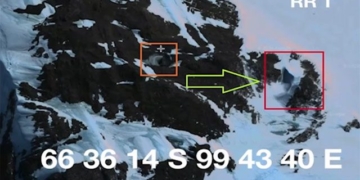Frank Hoogerbeets, a researcher who previously predicted a series of massive earthquakes in Turkey and Syria in early February, believes the probability of a similar earthquake occurring in the region of India, Afghanistan, and Pakistan is very low but still possible.
This speculation is based on the study of planetary movements and their influences. On his personal Twitter page, spatial geometry researcher Frank Hoogerbeets forecasted that a quake stronger than 7.5 magnitude would strike Turkey and Syria. His prediction came to fruition three days later. On February 6, four major tremors shook the two Middle Eastern countries, resulting in tens of thousands of fatalities, with damage still escalating.

Dutch researcher Frank Hoogerbeets in an interview with India Today.
Frank Hoogerbeets is currently working at the Solar System Geometry Survey Institute (SSGEOS), where he monitors the spatial geometry of celestial bodies related to seismic activity. His predictions have continued to stir controversy after he suggested that the South Asian region, including India, Pakistan, and Afghanistan, could face similar disasters in the future. In a private interview with India Today, this expert indicated that his warnings are based on observations and probability calculations. Although the likelihood is small, it cannot be ruled out.
“The reason I tweeted on February 3 was based on extensive research I had conducted. This research is grounded in past deadly earthquakes that have impacted this region. On February 3, several seismic activities were observed in the area. I thought I should warn people that a strong earthquake could soon strike this region. However, I did not anticipate it would happen just three days later,” he stated.
Nevertheless, theories regarding earthquakes have not been widely accepted. The United States Geological Survey asserts that no scientist has “successfully predicted a major earthquake.” The Dutch researcher himself acknowledges this. He mentioned that his research method is also controversial. He and his colleagues conduct extensive studies on past earthquakes and specifically examine the positions of planets. They try to identify a pattern and use that model to predict larger earthquakes in the future.
As of now, Hoogerbeets believes it is functioning effectively. The issue with Hoogerbeets’ approach and that of his colleagues is that their forecasting model incorporates planetary movements. The scientific community has never accepted that planets influence earthquake risks on Earth. However, the research team insists that planets do indeed have an effect on Earth.
Frank Hoogerbeets continues to stir debate, as in a recent video, he predicted a significant earthquake would occur in the South Asian region, extending from Afghanistan through Pakistan to India. The aftershocks could even be felt in the Indian Ocean. This prediction quickly caused a stir online and within the scientific community. Many have refuted the accuracy of making predictions about the likelihood of an earthquake in a specific area. Hoogerbeets also explained this in his conversation with India Today.
“There seems to be a bit of confusion because in the prediction, we explained the purple zone. That does not mean a fault line. It does not mean there will be an earthquake starting from Afghanistan and extending to the Indian Ocean. It simply marks another atmospheric fluctuation, indicating areas that could experience a larger earthquake. It could be Afghanistan or Pakistan, or if it occurs a bit further east, it could be in India as it was in 2001, but nothing is certain,” Frank Hoogerbeets said.
Analyst Hoogerbeets further stated that the positions of the planets and the Moon need to be considered, followed by isolating key time frames as the research team did from February 4 to 6. Subsequently, they examine atmospheric fluctuations to determine where significant seismic activity may occur.
Immediately after this information was released, the Pakistan Meteorological Department dismissed the possibility of a major earthquake occurring in the Afghanistan-Pakistan region. In response, Hoogerbeets stated that this information is not necessarily a declaration. The research team never claimed it would happen, but the area does have a probability of experiencing a major earthquake.


















































